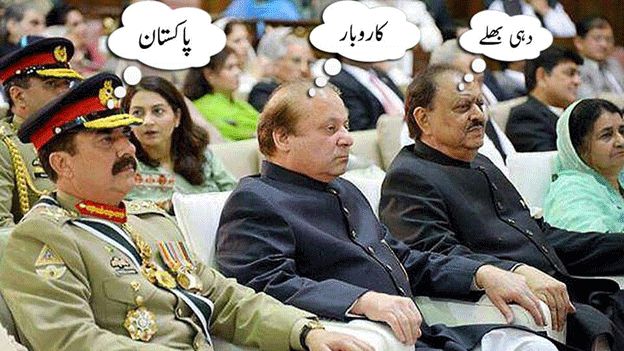by CYRIL ALMEIDA
 (Left to right) Pakistan’s army chief Raheel Sharif, Prime Minister Nawaz Sharif, and President Mamnoon Hussein PHOTO/BBC
(Left to right) Pakistan’s army chief Raheel Sharif, Prime Minister Nawaz Sharif, and President Mamnoon Hussein PHOTO/BBC
In a blunt, orchestrated and unprecedented warning, the civilian government has informed the military leadership of a growing international isolation of Pakistan and sought consensus on several key actions by the state.
As a result of the most recent meeting, an undisclosed one on the day of the All Parties’ Conference on Monday, at least two sets of actions have been agreed.
First, ISI DG Gen Rizwan Akhtar, accompanied by National Security Adviser Nasser Janjua, is to travel to each of the four provinces with a message for provincial apex committees and ISI sector commanders.
The message: military-led intelligence agencies are not to interfere if law enforcement acts against militant groups that are banned or until now considered off-limits for civilian action. Gen Akhtar’s inter-provincial tour has begun with a visit to Lahore.
Second, Prime Minister Nawaz Sharif has directed that fresh attempts be made to conclude the Pathankot investigation and restart the stalled Mumbai attacks-related trials in a Rawalpindi antiterrorism court.
Those decisions, taken after an extraordinary verbal confrontation between Punjab Chief Minister Shahbaz Sharif and the ISI DG, appear to indicate a high-stakes new approach by the PML-N government.
The following account is based on conversations with Dawn of individuals present in the crucial meetings this week.
All declined to speak on the record and none of the attributed statements were confirmed by the individuals mentioned.
Foreign secretary’s presentation
On Monday, on the day of the All Parties’ Conference, Foreign Secretary Aizaz Chaudhry gave a separate, exclusive presentation in the Prime Minister’s Office to a small group of civil and military officials.
The meeting was chaired by Prime Minister Sharif and included senior cabinet and provincial officials. On the military side, ISI DG Rizwan Akhtar led the representatives.
The presentation by the foreign secretary summarised the results of the recent diplomatic outreach by Pakistan, the crux being that Pakistan faces diplomatic isolation and that the government’s talking points have been met with indifference in major world capitals.
On the US, Mr Chaudhry said that relations have deteriorated and will likely further deteriorate because of the American demand that action be taken against the Haqqani network. On India, Mr Chaudhry stated that the completion of the Pathankot investigation and some visible action against Jaish-i-Mohammad were the principal demands.
Then, to a hushed but surprised room, Mr Chaudhry suggested that while China has reiterated its support for Pakistan, it too has indicated a preference for a change in course by Pakistan. Specifically, while Chinese authorities have conveyed their willingness to keep putting on technical hold a UN ban on Jaish-i-Mohammad leader Masood Azhar, they have questioned the logic of doing so repeatedly.
Dawn for more
